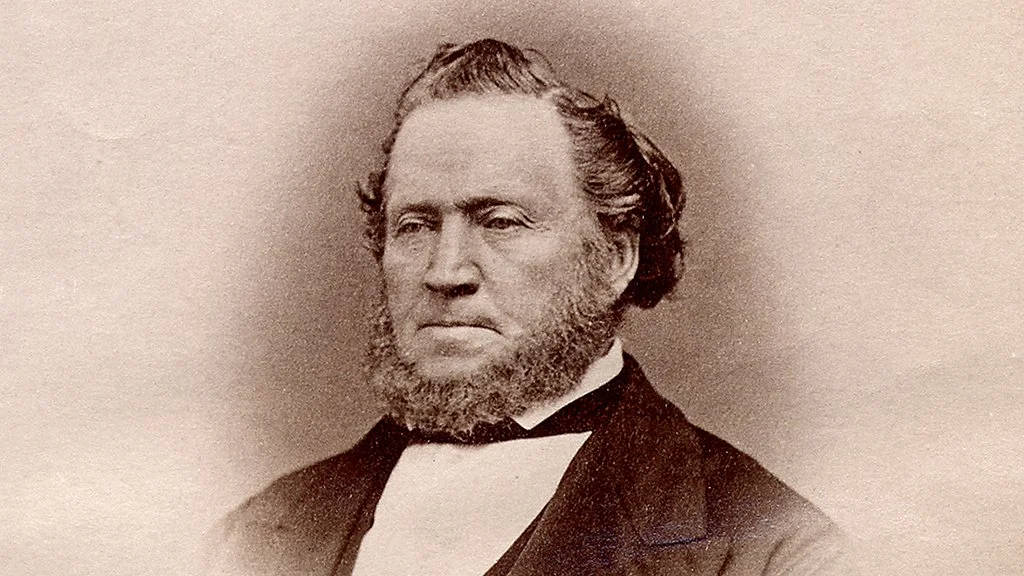The Mormon Blasphemy of Blood Atonement
Warren Jeffs | Current FLDS Leader
COLORADO CITY | Outside of fundamentalist circles, the false doctrine of limited atonement usually sprouts up within Calvinist ideologies. Infamously represented by the middle letter “L” in the acronym “T.U.L.I.P” to describe the five pillars of the “sovereign” view of that group.
Within the Fundamentalist Latter Day Saints, a group adhering to what Joseph Smith originally prescribed, however, this false doctrine still thrives and is very much alive.
Running on the false premise that the blood of a sinner is equivalent to or offers any legitimate aid to the salvation of the individual, Brigham Young pursued this approach as a justified consequence for apostasy, theft, and fornication when he took Mormonism westward.
Apostasy was defined as anyone remotely defiant of the teachings of the LDS prophet, as it was seen as direct opposition to Jesus Christ and the “restored” church.
Theft is self explanatory — and if you aren’t aware of the term fornication, it’s two people coming together physically before or in the absence of a marriage covenant.
Both Joseph Smith and Brigham Young taught that the doctrine of blood atonement was a way to ensure that the law of Moses remained fulfilled within their territory. The root of this belief is that someone could commit sinful acts beyond the hope of redemption — this is something doctrinally that the Mormons share with the Calvinist camp.
In an article discussing the topic of the blood atonement doctrine, researcher Bill McKeever shed light on how pillars of the pioneer priesthood actively taught that examples of the blood atonement doctrine in action include Judas Iscariot, who betrayed the Lord Jesus Christ as part of the inner circle of disciples.
“There are sins that men commit for which they cannot receive forgiveness in this world, or in that which is to come, and if they had their eyes open to see their true condition, they would be perfectly willing to have their blood spilt upon the ground, that the smoke thereof might ascend to heaven as an offering for their sins, and the smoking incense would atone for their sins, whereas, if such is not the case, they will stick to them and remain upon them in the spirit world (JOD 4:53).”
The manipulative element here is that this was carried out in such a successful way that Smith and Young had the early Utah-bound pioneers believing that the proper way to carry out their idea of a restoration of the gospel was to deem Christ’s death, burial, and resurrection as insufficient atonement.
To keep the flame alive within their cult dynamic, Brigham Young doubled down and then some on this doctrine; even moreso than their founding prophet.
According to a sermon published by the LDS media wing the Deseret News and verified by the UMKC School of Law, Brigham Young also said the following:
“It is true that the blood of the Son of God was shed for sins through the fall and those committed by men, yet men can commit sins which it can never remit.... There are sins that can be atoned for by an offering upon an altar, as in ancient days; and there are sins that the blood of a lamb, or a calf, or of turtle dove, cannot remit, but they must be atoned for by the blood of the man.”
Blood atonement is just one of many fundamental Mormon doctrines that strays from what’s established by the Bible. This conundrum creates an eternal circular issue for the adherents to this system for the simple fact that they cannot be a restoration of something that they do not even honor as the original.
The Smith-inspired scripture that they rely on is found in Doctrine & Covenants chapter 132 and verse 6, which states:
“6 And as pertaining to the new and everlasting covenant, it was instituted for the fulness of my glory; and he that receiveth a fulness thereof must and shall abide the law, or he shall be damned, saith the Lord God.”
Because of this appeal to authority, the early Mormons were bewitched into believing that despite Jesus’ payment on the cross to atone for the sins in full of all who believe on Him, they still owed a sort of cosmic debt.
Partial forgiveness is the issue at the root of the false doctrine of limited atonement. The reason that this is the case is because the ultimate goal of Mormonism isn’t salvation — it’s exaltation.
Pursuant to the rest of the Doctrine & Covenants, especially chapter 132, there is no hiding the fact that the end goal is only exaltation (to become a god). For this cause, Joseph Smith, Brigham Young, and other fundamentalist leaders including active prophet Warren Jeffs all teach the need for those under their sway to pursue exaltation at all costs.
Brigham Young | Successor to Joseph Smith
Even when, especially if asked of them by the prophet— death.
Per a report published in the Phoenix New Times, Warren Jeffs faced a flurry of criminal charges inspired specifically by the bloodshed demanded by Brigham Young by way of declaring it an act of a sedistic form of love.
Here is the specific quote from Young from the report:
“Will you love that man or woman well enough to shed their blood? That is what Jesus Christ meant...”
This is just one of the many historical proofs kept in a personal collection of Warren Jeffs.
You can find this Brigham Young citation in Rulon Jeffs’ self-authored work titled Purity in the New Everlasting Covenant of Marriage in which he also promotes and protects the falsehood of plural marriage.
Warren Jeffs acted this out as well in his time outside of prison, as noted in the same Phoenix New Times report.
“Vanessa had committed the most vile of sins in the fundamentalist Mormon world: She had taken a boyfriend of her own choosing instead of marrying the man Warren Jeffs had chosen for her.
For that transgression, she was to die.
”Warren wanted Vanessa blood-atoned,” says Ron Barton, a criminal investigator in Utah Attorney General Mark Shurtleff’s office.
What Jeffs wants, he usually gets.”
The article continues, saying, “to violate a command by Jeffs -- seen by devotees as God's earthly representative and the ultimate authority on assignments into polygamous marriages -- is an unpardonable transgression that can lead to severe punishment.”
Jeffs attempted to hunt down Vanessa Rohbock as far as a sister fundamentalist group in Canada and was pursued with the intent to put her to death for disobeying the prophet.
Vanessa’s father, Ron Rohbock, was a bodyguard of Warren Jeffs at the time and was also tasked with participating in the blood sport - she eventually returned to Colorado City, Arizona, where Warren Jeffs was headquartered.
Her life was spared at the decree of Warren Jeffs on the sole basis that she succumb to his wishes and marry the man that he commanded her to marry — obey or perish, in the worst kind of way.
The Utah Attorney General was aware of this case and it nearly led to additional charges against Jeffs.
“The Utah Attorney General's Office, Barton says, was considering charging Jeffs with conspiracy to commit murder for issuing the blood-atonement order on Vanessa. But with Vanessa back in the FLDS fold, whether of her own volition or not, the case was shelved in favor of what the AG's Office hopes will be more prosecutable crimes by the prophet.”
From within the Mormon Tabernacle, Brigham Young delivered several congregational addresses speaking of the promises of the founding prophet as well as some newfound hope for the Mormon pioneers was promised under his power.
Here’s another quote from Young in an 1857 address — in this, you see the manipulative nature of the narrative as it spun in a way that paints blood atonement as a way to love your neighbor.
It’s blasphemy beyond repair.
"This is loving our neighbor as ourselves; if he needs help, help him; and if he wants salvation and it is necessary to spill his blood on the earth in order that he may be saved, spill it....if you have sinned a sin requiring the shedding of blood, except the sin unto death, would not be satisfied nor rest until your blood should be spilled, that you might gain that salvation you desire. That is the way to love mankind."
At the heart of the matter, the Mormon doctrine differs from Christianity at this important junction.
If God's free gift is salvation by grace through faith, as Ephesians 2:8-9 tells us in the Bible, then Joseph Smith and the succession of prophets after him deem this grace as insufficient.
Moreover, the Bible is clear that the blood of bulls, goats, and other animals never truly atoned for the sins of the people. Instead, this Old Testament practice was for the purpose of preparing the Israelites for when Jesus Christ would arrive in the flesh as the atonement for the sins of the world.
Therefore, limited atonement in the FLDS world is applied as a doctrine of control instead of a doctrine of care — and anything but a doctrine of love.
It neither reflects the love of the God of the Bible nor the reality of consequences for capital crimes, but instead establishes control in the hands of a deranged lunatic looking to exalt himself (and themselves collectively) as their own gods.



